BUDGET HEARING, SCHURZ: CPS offiicials -- including Claypool -- hear outrage from people of the Northwest Side... CPS officials smile as speaker after speaker exposes CPS strategy of sabotaging the real public schools and increasing money for privatization, especially charter schools...
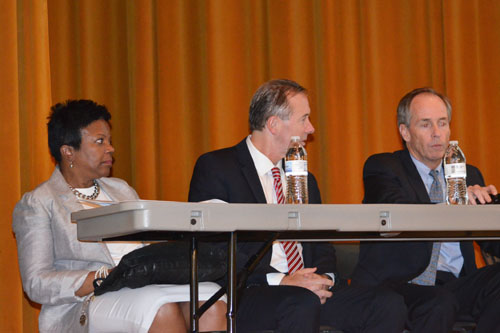 Denise Little, Forrest Claypool, and Tim Cawley sitting on stage at Chicago's Schurz High School as the budget hearing began on August 18, 2015. Substance photo by George N. Schmidt.Officials of Chicago Public Schools tried to shut down every speaker who breathed a word after having gotten the allocated two minutes to testify about the Proposed Budget for the 2015 - 2016 school year (officially, "FY16," for fiscal year 2016) during the budget hearing on the evening of August 18, 2015, at Schurz High School.
Denise Little, Forrest Claypool, and Tim Cawley sitting on stage at Chicago's Schurz High School as the budget hearing began on August 18, 2015. Substance photo by George N. Schmidt.Officials of Chicago Public Schools tried to shut down every speaker who breathed a word after having gotten the allocated two minutes to testify about the Proposed Budget for the 2015 - 2016 school year (officially, "FY16," for fiscal year 2016) during the budget hearing on the evening of August 18, 2015, at Schurz High School.
The Board refused to provide the people with actual copies print of the budget. They are claiming, once again, that the supposedly beleaguered school system can't afford to print copies (although during any of the past four years, the Board of Education has voted to pay more than the printing would have cost to "relocate" out-of-town bureaucrats to Chicago, while snubbing, over and over, local talent).
And the Board claimed, right up to the supposed start time of the hearings at six p.m., that the time lines would be enforced strictly.
As the hour for the hearings to begin came and went, however,there was no hearing. Somehow the strict times were not being followed (at least for CPS officials). Finally, one of the assembled unidentified bureaucrats on the stage (there were no signs indicating who was sitting there nodding, or calling 'TIME!') said that there would be a "delay." The cause of the delay was not explained, and it clearly wasn't a technical problem with the overhead that was poised to present the Board's brief Power Point.
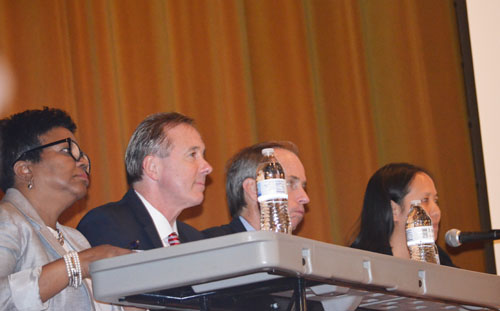 Although they had difficulty following their scripts, top CPS officials tried to smile and avoid questions during the Schurz budget hearing on August 18, 2015. "Chief Executive Officer" Forrest Claypool was rushed in from the Mayor-issued black SUVs, pushing past reporters, and seated on the stage to smile throughout the testimony of angry citizens. After the hearing, Claypool was hustled out as quickly as possible, while CPS's expensive "Communications" staff tried to stop reporters from asking Claypool any questions, while trying to set up private "briefings" with selected reporters, but only those who had been providing "friendly coverage" to the CPS version of reality. Despite their significant pay from the publis purse, the top executives of the nation's third largest school system are avoiding any real "transparency." Left to right, above: Denise Little (currently "Special Advisor to the Chief Executive Officer," annual salary $195,000), Forrest Claypool ("Chief Executive Officer," annual salary $250,000), Tim Cawley ("Chief Administrative Officer," annual salary 215,000). Substance photo by George N. Schmidt.By nearly 6:30, "Mr. Delay" walked in. Forrest Claypool, who had been chauffeured to the meeting by those black SUVs that usually carry Chicago's mayor speedily from event to event had arrived. Claypool was surrounded by propaganda flacks and others, all wearing the same smiles. The recently appointed "Chief Executive Officer" of the nation's third largest school system, Forrest Claypool, had arrived for his first public schools budget hearings. The CEO seated himself on stage between the CAO ("Chief Administrative Officer") Tim Cawley and the CIO ("Chief Instruction Officer") Denise Little. (Substance later learned that the CFO ("Chief Financial Officer") Ginger Ostro and the CEdO ("Chief Education Officer"), Janice Jackson, were at the other hearings in other parts of the town. With the arrival of the CEO, the Schurz hearings could finally begin.
Although they had difficulty following their scripts, top CPS officials tried to smile and avoid questions during the Schurz budget hearing on August 18, 2015. "Chief Executive Officer" Forrest Claypool was rushed in from the Mayor-issued black SUVs, pushing past reporters, and seated on the stage to smile throughout the testimony of angry citizens. After the hearing, Claypool was hustled out as quickly as possible, while CPS's expensive "Communications" staff tried to stop reporters from asking Claypool any questions, while trying to set up private "briefings" with selected reporters, but only those who had been providing "friendly coverage" to the CPS version of reality. Despite their significant pay from the publis purse, the top executives of the nation's third largest school system are avoiding any real "transparency." Left to right, above: Denise Little (currently "Special Advisor to the Chief Executive Officer," annual salary $195,000), Forrest Claypool ("Chief Executive Officer," annual salary $250,000), Tim Cawley ("Chief Administrative Officer," annual salary 215,000). Substance photo by George N. Schmidt.By nearly 6:30, "Mr. Delay" walked in. Forrest Claypool, who had been chauffeured to the meeting by those black SUVs that usually carry Chicago's mayor speedily from event to event had arrived. Claypool was surrounded by propaganda flacks and others, all wearing the same smiles. The recently appointed "Chief Executive Officer" of the nation's third largest school system, Forrest Claypool, had arrived for his first public schools budget hearings. The CEO seated himself on stage between the CAO ("Chief Administrative Officer") Tim Cawley and the CIO ("Chief Instruction Officer") Denise Little. (Substance later learned that the CFO ("Chief Financial Officer") Ginger Ostro and the CEdO ("Chief Education Officer"), Janice Jackson, were at the other hearings in other parts of the town. With the arrival of the CEO, the Schurz hearings could finally begin.
The hearings on the Proposed Budget for FY 2016 (the 2015 - 2016 school year) marked another historical moment. For the fifth year in a row, Chicago's political leaders tolerated the claim by officials of their school system that the annual "Proposed Budget" should be denied to the public prior to the public hearings -- unless those members of the public had sophisticated computers and the ability to print more than 1,000 pages of documents, mostly in PDF form.
For more than 150 years, the annual budget had been prepared at the Board of Education and distributed throughout the city at public libraries, aldermanic offices, and other locations. As a result, people could actually read and study the proposed budget prior to the hearings in the format that has been popular in the West since the 15th Century invention of the printing press by Johannes Gutenberg. Instead of a printed copy of the budget, those who arrived at Schurz High School for the hearings on August 18, 2015, were greeted by smiling junior officials of CPS. Those officials gave citizens a four-page summary of what the Proposed Budget supposedly said. Asked by this reporter whether there were actual copies of the budget available prior to the hearings, the affable young smilers said, "No. They are on line..."
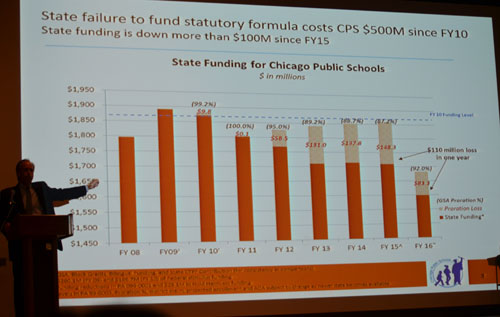 The Board of Education continued to refuse to provide the public and the city's public officials and public libraries with copies of the proposed budget, and then added insult to injury by doing a brief and mendacious Power Point presentation supposedly showing what perils CPS faces. Above, CPS "Chief Administrative Officer" Tim Cawley shows off the third slide in the CPS Power Point presentation, showing a decline in State of Illinois funding for Chicago's public schools. CPS officials left out completely any mention of local property tax revenues as a source of funding for Chicago's schools, failing to note that at this point in history, the fact is that Chicago's property taxes are the lowest in the six-county greater Chicago area, according to the Civic Federation (hardly a radical group). Suburban and downstate lawmakers, rather than being intimidated by CPS claims that members of the General Assembly are "racist" when they don't provide more money for CPS simply reply that even challenged school districts like Proviso (Maywood) taxpayers pay much more than Chicago taxpayers to support their schools and other public services. For more than ten years, CPS officials have ignored local revenue sources, while always trying to maintain that the entire burden should fall on the State of Illinois. In the left corner, above, gesticulating towards his Power Point is Chief Administrative Officer Tim Cawley. Substance photo by George N. Schmidt. A large number of those who were arriving for the hearings were used to the insults from CPS officials, including the refusal of the Board to publish the budget and the mendacious claim that the "austerity" forced on the system made it necessary to "save" funds by depriving most of the public of the historically important documents. "You can read it on line," was the smiling answer. "But what if I don't have a computer, or if the library is closed..." is a response -- to blank stares.
The Board of Education continued to refuse to provide the public and the city's public officials and public libraries with copies of the proposed budget, and then added insult to injury by doing a brief and mendacious Power Point presentation supposedly showing what perils CPS faces. Above, CPS "Chief Administrative Officer" Tim Cawley shows off the third slide in the CPS Power Point presentation, showing a decline in State of Illinois funding for Chicago's public schools. CPS officials left out completely any mention of local property tax revenues as a source of funding for Chicago's schools, failing to note that at this point in history, the fact is that Chicago's property taxes are the lowest in the six-county greater Chicago area, according to the Civic Federation (hardly a radical group). Suburban and downstate lawmakers, rather than being intimidated by CPS claims that members of the General Assembly are "racist" when they don't provide more money for CPS simply reply that even challenged school districts like Proviso (Maywood) taxpayers pay much more than Chicago taxpayers to support their schools and other public services. For more than ten years, CPS officials have ignored local revenue sources, while always trying to maintain that the entire burden should fall on the State of Illinois. In the left corner, above, gesticulating towards his Power Point is Chief Administrative Officer Tim Cawley. Substance photo by George N. Schmidt. A large number of those who were arriving for the hearings were used to the insults from CPS officials, including the refusal of the Board to publish the budget and the mendacious claim that the "austerity" forced on the system made it necessary to "save" funds by depriving most of the public of the historically important documents. "You can read it on line," was the smiling answer. "But what if I don't have a computer, or if the library is closed..." is a response -- to blank stares.
The Board presented a brief and dishonest (see graphic and below, comments by this reporter) Power Point. It was narrated by "Chief Administrative Officer" Tim Cawley.
To believe the Power Point and Cawley's script, Chicago Public Schools receives all its revenue from the State of Illinois. According to Cawley's script, it is solely because the State of Illinois is "underfunding" Chicago's schools and because CPS has to pay such huge payments to the Chicago Teachers Pension Fund, the budget is out of balance.
But, as this reporter noted later when I spoke, Cawley's presentation ignored the largest source of CPS revenue -- local property taxes. Anyone who didn't know more about the city's schools and the financing of schools in Illinois would have been led to believe that Chicago was begin short changed by Springfield, and that, as Cawley put it, the entire political agenda should be for parents, teachers and CPS officials to be "partners" going to the State Capitol and demanding what Cawley says CPS should get. As Cawley made his presentation, CEO Forrest Claypool sat on the side of the stage, nodding and smiling in agreement.
After Cawley's presentation, the first person to speak during public participation was 45th Ward alderman John Arena, who devoted nearly ten minutes to outlining how the budget will be affecting schools in his ward. Arena began by telling the CPS officials that Schurz High School, where the hearing was taking place, was now in the 45th Ward. He talked critically about how the Board's budget cuts at Schurz were undermining a partnership he, the school, and a group of companies had arranged.
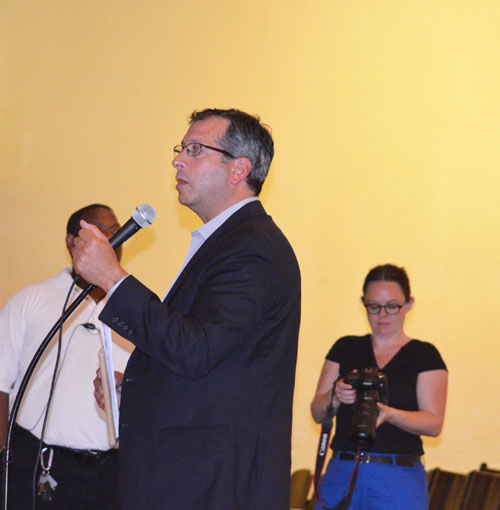 John Arena, alderman of the 45th Ward, gave a detailed critique of the Board's budget and priorities, citing examples from the schools in the 45th Ward. Arena noted that CPS budget cuts at Schurz High School, where the hearings were taking place, jeopardized a community partnership that the alderman and local school officials had arranged. Arena joined many others who criticized the Board's draconian cuts in special education services, citing the cuts at Beard school, in the 45th Ward, as one example. Substance photo by George N. Schmidt.Arena went on to criticize the Board's cuts in special education. He cited the cuts at Beard School, which specializes in serving children with disabilities. (No one at the hearing spoke about what CPS official have pretentiously re-branded as "diverse learners", noting that special education is what the services are called and specialized services are what are required. Only in Chicago can members of the Board of Education and officials like Cawley and Claypool sit with straight faces while their highest paid officials discuss the latest from OODLSS (the "Office of Diverse Learners Support Services). Arena patiently went through a listing of the problems facing schools in his ward, and suggesting solutions. First, he noted that Schurz High School was now in the 45th Ward and that he had been working with the Schurz staff to make the school a welcoming destination and choice for community residents. He noted that it was a challenge "getting people to see Schurz as their school," but talked about work he had helped with to improve the offerings from Schurz, after praising the school's staff, principal, and Local School Council.
John Arena, alderman of the 45th Ward, gave a detailed critique of the Board's budget and priorities, citing examples from the schools in the 45th Ward. Arena noted that CPS budget cuts at Schurz High School, where the hearings were taking place, jeopardized a community partnership that the alderman and local school officials had arranged. Arena joined many others who criticized the Board's draconian cuts in special education services, citing the cuts at Beard school, in the 45th Ward, as one example. Substance photo by George N. Schmidt.Arena went on to criticize the Board's cuts in special education. He cited the cuts at Beard School, which specializes in serving children with disabilities. (No one at the hearing spoke about what CPS official have pretentiously re-branded as "diverse learners", noting that special education is what the services are called and specialized services are what are required. Only in Chicago can members of the Board of Education and officials like Cawley and Claypool sit with straight faces while their highest paid officials discuss the latest from OODLSS (the "Office of Diverse Learners Support Services). Arena patiently went through a listing of the problems facing schools in his ward, and suggesting solutions. First, he noted that Schurz High School was now in the 45th Ward and that he had been working with the Schurz staff to make the school a welcoming destination and choice for community residents. He noted that it was a challenge "getting people to see Schurz as their school," but talked about work he had helped with to improve the offerings from Schurz, after praising the school's staff, principal, and Local School Council.
Arena then moved to his second major point: the large cutbacks in special education staffing at schools in the 45th Ward. He noted that at Beard Elementary School, which serves special education students, the cutbacks which CPS claims are based on "student based budgeting" are undermining the school and pose serious challenges to everyone who will be left. He noted that so-called "student-based budgeting" was damaging students and undermining the city's traditional public schools.
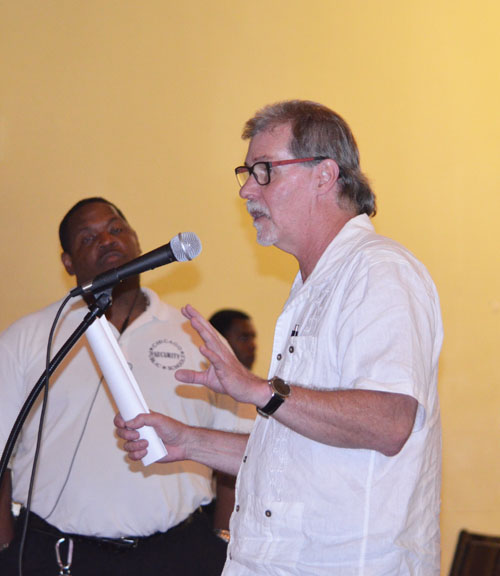 Access Living's Rodney Estvan warned the Board that it was in danger of violating federal law if the massive cuts, amounting to 625 people, against special education services are implemented. Substance photo by George N. Schmidt. He then challenged that Board's claim, repeated in Cawley's narration of the Power Point, that CPS has to succeed, with its "partners," to get nearly a half billion dollars in "relief" from Springfield. Arena asked what happens if that doesn't take place, noting that CPS had "no Plan B."
Access Living's Rodney Estvan warned the Board that it was in danger of violating federal law if the massive cuts, amounting to 625 people, against special education services are implemented. Substance photo by George N. Schmidt. He then challenged that Board's claim, repeated in Cawley's narration of the Power Point, that CPS has to succeed, with its "partners," to get nearly a half billion dollars in "relief" from Springfield. Arena asked what happens if that doesn't take place, noting that CPS had "no Plan B."
Finally, to loud applause, Arena told the Board and the hearing that he opposed charter school expansion. Many of those present had gone through the school and unit sections of the budget and noted that while most of the city's traditional public schools were facing severe cuts, most (not all) of the city's charter schools were getting more dollars than last year. No one from the Board answered any of the questions raised by Arena's statements.
The first registered speaker for public participation was Rodney Estvan of Access Living Chicago, a group that works for the rights of disabled people. Estvan began by noting that the Board's claims about its inability to raise property taxes beyond the "cap" was not true. He said that under the PTEL law, which governs the "cap", the Board could ask for a citywide referendum to raise local property taxes.
Noting that Access Living's complete report on the budget would be released before the August 26 Board meeting, Estvan challenged the way in which the Board was cutting special education services. He noted that special education in Chicago's public schools is what he called an "aide dependent system," and that the children with disabilities would suffer greatly because of the cuts not only of teachers, but of clinicians and the numerous aides who service these children, from bus aides (which have been eliminated) to those who handle certain chores in the classrooms (including diaper changes for those who need them). Again, no one from the "Board" people on stage spoke.
Estvan was followed by teacher Jerry Skinner, from Kelvyn Park High School. "This budget does not value out neighborhood schools," Skinner said forcefully. He noted that Kelvyn Park was suffering, again, major cuts, while the nearby Intrinsic Charter School was going to get a $2.6 million increase. Again, there were loud cheers when the preference by the budget for charter schools was factually noted.
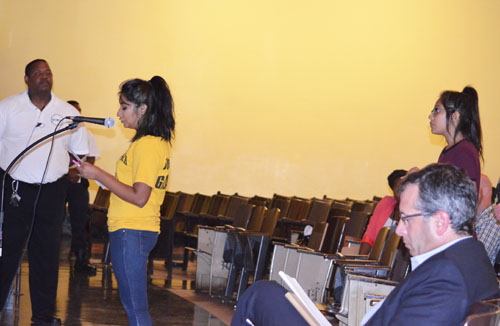 Recent Kelvyn Park High School graduate Jennifer Velazquez (above in yellow shirt at microphone) told the Board it should stop sabotaging her alma mater, and that she wants to finish college and return to teach there. Substance photo by George N. Schmidt.Among the several speakers from Kelvyn Park High School was 2012 graduate Jennifer Velazquez, who delivered the following remarks:
Recent Kelvyn Park High School graduate Jennifer Velazquez (above in yellow shirt at microphone) told the Board it should stop sabotaging her alma mater, and that she wants to finish college and return to teach there. Substance photo by George N. Schmidt.Among the several speakers from Kelvyn Park High School was 2012 graduate Jennifer Velazquez, who delivered the following remarks:
"Why are you setting up the students of Kelvyn Park up for failure?" she asked, demanding to know why CPS officials were increasing the number of dollars for the two charter schools near Kelvyn Park (Aspira Central Park and Milwaukee; Intrinsic). She spoke eloquently, telling the CPS officials that she intended to return to Kelvyn Park to teach. Jennifer Velazquez was followed by other speakers from Kelvyn Park, all of whom were well informed about the facts of how the budget was once again depriving Kelvyn Park (and other real public schools) of the resources necessary to continue doing its job. They also all knew the facts about how the Board of Education had been taking dollars away from the city's real public schools and towards charter schools.
Jennifer Velazquez was followed by another Kelvyn Park graduate, Doris Salgado, now a student at the University of Illinois at Chicago. Salgado told the hearing:
"Hi my name is Doris Salgado. I recently graduated from Kelvyn Park High School in June. Believe it or not I actually dreaded going to Kelvyn Park my freshman year due to the bad reputation it rumored to have. But I would of never thought Kelvyn Park to become such an important part of my life. Kelvyn Park helped and motivated me to keep good grades and to continue on to college. I am a product of a public neighborhood school and I'm attending UIC the following Monday. I have Kelvyn Park to thank for this. But you see, Kelvyn Park doesn't have enough resources to help all students become college ready or to give them the necessary education needed so. By laying off the only social worker we had at Kelvyn Park you're leaving troubled students who need guidance to look for one their own. By laying off the only AP certified Spanish teacher Kelvyn Park had you're not giving the opportunity for students to receive college credit. By laying off the only college counselor Kelvyn Park had you're not motivating students to be college bound. By laying off my favorite and one of the two counselors Kelvyn Park had you're basically leaving Kelvyn Park to fend on their own. The more money you take from us, the more difficult you make it for Kelvyn Park to function. The more resources or genuinely caring staff you take away from us, the more difficult you make it for us to motivate these students who face daily personal struggles at home. These students are the future and have the potential to succeed just like any other student from charter schools, we just need more financial help. I used to believe Kelvyn Park had a bad reputation due to the majority of the student population not meeting the academic standards but what message are you trying to give these students and the community if you're setting them up to fail? Now tell me what are your solutions to revive Kelvyn Park High School?"
Some of the speakers also began noting that the agenda of the Chicago Board of Education, its seven members, and its top executives, including Tim Cawley and Forrest Claypool, was not to create and improve a public school system, but to sabotage and destroy it. The evidence both from the Proposed Budget and in the regular actions of the Board of Education demonstrated conclusively that the Board and its executives were there to create the most privatized school system among the nation's major cities, and that they would do it by lying, cheating and stealing from and to the city's children and the majority of Chicago's citizens.
Vaughn parents Josh Radinsky spoke based on the following letter, which he sent to the Board's special education office:
Josh Radinsky, Vaughn HS LSC parent
6528 N. Campbell Ave, Chicago IL 60645
josh.radinsky@gmail.com
(773) 391-6059
Markay Winston, Director, CPS Office of Diverse Learner Supports and Services
Forrest Claypool, Chief Executive Officer, Chicago Public Schools
Rahm Emanuel, Mayor of Chicago
August 18, 2015
Dear Dr. Winston, Mr. Claypool and Mayor Emanuel:
I am a parent of a student with special needs at Vaughn High School, and I am alarmed by the cuts to special education services recently announced throughout the city. Almost half of our school's staff was cut by CPS � Vaughn lost more positions than any other school, even though Vaughn serves 100% students with disabilities. These cuts are devastating to our children�s education, are unlikely to save money in the long run, and appear to create multiple violations of federal law. My son Samuel will be a senior at Vaughn this year. Sam has Down Syndrome, and he has been a CPS student since pre-school. At his IEP meeting each year we have worked with his case manager and teachers to identify appropriate goals for Sam. He has made huge advances since coming to Vaughn High School as a freshman. He is an avid reader, has interests in science and social studies, has strong friendships and social skills, and looks forward to training for a job as an adult.
The program at Vaughn gives my son the support and instruction he needs to learn to function independently in the community and in the adult world. Vaughn has Community-Based Instruction every week, where our kids get valuable real-world work experience, get to know different parts of the city, and volunteer to help others, within a supportive community of peers. Vaughn has exposed Sam to realistic career possibilities, has pushed him to advance his independence in communication and self-awareness, has built his academic skills in each subject, and has helped him learn to help himself.
A major part of the effectiveness of Vaughn�s program is the excellent staff of para-professionals (PSRPs) who support our kids. They work closely with the teachers, and develop strong relationships with the students. They are crucial for helping students learn to transition well from one activity or location to the next, a skill that can be very challenging for many young people with cognitive disabilities. They help our children develop strong daily functioning skills that are essential for the transition to adulthood and greater independence. They facilitate appropriate communication with adults and peers, help students navigate social and academic challenges, provide safety and support for meeting medical and personal care needs, and foster positive relationships. They reinforce teachers� instruction, building classwork and homework skills. The PSRPs are a great part of the reason that Vaughn has one of the most positive and supportive social environments you will find at any school, which is evident to any visitor who walks in the doors of Vaughn.
Sam has developed a great deal of independence at Vaughn in his academic work. He does not require a 1-to-1 aide at this time, but his IEP identifies specific supports required for him to access the curriculum in English language arts (200 minutes a week), math (200 minutes), science (80 minutes), social sciences (40 minutes), and vocational training (100 minutes, which will be more important than ever his senior year). For a young man with Down syndrome, these supports are crucial for building the skills, independence and confidence needed to become a gainfully-employed citizen of Chicago.
Each student at Vaughn deals with unique challenges. Many require 1-to-1 aides. Each student�s IEP reflects years of hard work, learning, and development on the part of the student and their parents, guardians, teachers and support staff. The supports named in their IEPs are not �gifts� from CPS: they are contractual obligations of the district to our students under the Individuals with Disabilities Education Act (IDEA), diagnosed by professionals and agreed upon with families. With more than half of our PSRP positions cut, how can our school provide the supports our students need? We clearly have a budget crisis at CPS, and clearly the city must improve in managing the district�s finances responsibly. We understand that this is a great challenge you are facing. Part of this fiscal responsibility includes meeting the mandates of federal laws that protect people with disabilities. But more important is the moral responsibility to provide the required assistance to those people in our city who have the greatest needs. Balancing a budget on the backs of those who are most vulnerable, our children with disabilities, is not only illegal � it is morally wrong. It is also unlikely to save money: an avalanche of lawsuits will surely force CPS to restore many of the extreme cuts to special education.
Our administrators and teachers have been working tirelessly to try to restore positions by providing detailed documentation of each student�s needs. We have faced cuts every year, and our teachers and administrators have worked constantly to do more with less. As a CPS parent and LSC member, I urge you to restore the cuts to special education, to restore the PSRP and teacher positions cut from Vaughn, and to find a more sound way to manage the district�s finances that does not cause such disruption and hardship to our children with disabilities. Respectfully yours,
Josh Radinsky
Vaughn High School Parent and Local School Council member

